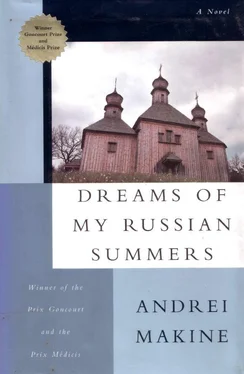Her face screwed up into an expression at once scornful and anxious. Her lips trembled.
"Are you sick or what?" she said, interrupting me in that slightly nasal tone that girls on the Mountain of Joy adopted to rebuff unwanted attention.
I stood stock-still. She went off, climbing toward the first buildings of the port, and soon plunging into their massive shadow. The workers were beginning to appear at the gates of their workshops.
Some days later, in the nocturnal gathering at the Mountain, I heard a conversation between my classmates, who had not noticed that I was close by. One of the girls in their little circle had complained, they were saying, about her partner who did not know how to make love (they expressed the notion much more crudely); and apparently she had confided some comic details ("killing," said one of them) of his behavior. I was listening to them in the hope of some erotic revelations. Suddenly the name of the despised partner was mentioned – "Frantsuz" – it was my nickname, of which I was generally proud. "Frantsuz" – the Russian for a Frenchman. Through their laughter I picked up a quiet exchange of remarks between two friends, in the manner of a secret agreement: "Let's take care of her tonight, after the dancing. Us two. Agreed?"
I guessed they were still talking about her. I left my corner and went toward the exit. They saw me. "Frantsuz! Frantsuz…" The whispering accompanied me for a moment, then was lost in the first surge of the music.
The next day, without warning anyone, I left for Saranza.
I was going to that sleepy little town, lost in the middle of the steppes, to destroy France. I must put an end to Charlotte's France, which had made of me a strange mutant, incapable of living in the real world.
In my mind this destruction had to resemble a long cry, a howl of rage that would best express my whole revolt. So far this howl was welling up without words. They would come, I was sure of it, as soon as Charlotte's calm eyes rested on me. For the moment I was shouting silently. There were only images hurtling by in a chaotic and motley flood.
I saw the gleam of a pince-nez in the well-upholstered shadows of a huge black car. Beria was choosing a woman's body for the night. And our neighbor across the street, a quiet, smiling pensioner, was watering the flowers on his balcony, listening to the warbling of a transistor. And in our kitchen a man with his arms covered in tattoos was speaking of a frozen lake filled with naked corpses. And none of the people in the third-class carriage that was taking me toward Saranza seemed to notice these shattering paradoxes. They got on with their lives, calmly.
In my cry I wanted to spill out these images over Charlotte. I awaited a response from her. I wanted her to explain herself, to justify herself. For it was she who had passed on to me this French sensibility – her own – condemning me to live painfully between two worlds.
I would speak to her of my father with the hole in his head, that little crater where his life pulsed. And of my mother, from whom we had inherited the fear of an unexpected ring at the door on the eve of holidays. Both of them dead. Unconsciously I resented her for her calm during my mother's burial. And for the life, so European in its good sense and neatness, that she led at Saranza. I found in her the West personified, that rational and cold West against which Russians harbor an incurable grudge. That Europe which looks down condescendingly from the stronghold of its civilization on our barbarian miseries… the wars in which we died by the million, the revolutions whose scenarios it wrote for us… In my juvenile rebellion there was a large dose of this innate mistrust.
The French implant, which I thought had atrophied, was still within me and was preventing me from seeing. It split reality in two. As it had done with the body of that woman I had spied on through two different portholes: there was one woman in a white blouse, calm and very ordinary – and the other – that immense backside, whose potent carnality rendered the rest of the body almost useless.
And yet I knew that the two women were only one. Just like my shattered reality. It was my French illusion that confused my vision, like an intoxication, giving the world a deceptively lifelike mirage as its double…
My cry was ripening. The images I would find words for swirled in my eyes more and more rapidly: Beria murmuring to the driver, "Faster! Catch that one! Let me see…"; and a man in a Father Christmas costume, my grandfather Fyodor, arrested on New Year's Eve; and my father's charred village; and the slender arms of my beloved – childlike arms with blue veins; and that erect backside with its animal power; and that woman removing red varnish from her nails while the lower part of her body is possessed; and the little Pont-Neuf bag; and the "Verdun"; and all that French nonsense that was ruining my youth!
At Saranza station I remained on the platform for a moment. From force of habit I was looking for Charlotte's silhouette. Then with scornful anger I called myself a fool. No one was waiting for me this time. My grandmother had not the slightest inkling that I was coming! Furthermore, the train that brought me had no connection with the one I used to take each summer to come to this town. I had arrived in Saranza not in the morning but in the evening. And the incredibly long train, too long and massive for this little provincial station, moved off heavily, traveling to Tashkent, near the Asiatic border of the empire. Urgench, Bukhara, Samarkand, the echo of the forward stops reverberated in my head, awakening a yearning for the Orient, which is mournful and profound for every Russian.
This time everything was different.
The door was unlocked. It was still the period when one only locked one's apartment at night. I pushed it open, as in a dream. I had pictured this moment so clearly I thought I knew word for word what I was going to say to Charlotte, what I was going to accuse her of…
However, as I heard the imperceptible click of the door, as familiar to me as the voice of a friend, and breathed the light and pleasant aroma that always hung on the air in Charlotte's apartment, I felt my head emptying of words. Only a few snatches of my prepared howl still rang in my ears: "Beria! And that old man calmly watering his gladioli. And that woman cut in two! And the forgotten war! And your rape! And that Siberian suitcase, filled with old French scraps of paper, which I drag about like a prisoner's ball and chain! And our Russia, which you, a Frenchwoman, do not understand and will never understand! And my beloved, whom those two young swine are going to 'take care of!"
She did not hear me come in. I saw her sitting before the balcony door. Her face was bent over a light-colored garment spread out on her lap, her needle flashing (I do not know why, but in my memory Charlotte was always engaged in darning a lace collar)…
I heard her voice. It was not singing, but rather a slow recitation, a melodious murmur interrupted by pauses, which kept time with the flow of her silent thoughts. Yes, a French song, half hummed, half spoken. In the overheated torpor of the evening her notes gave an impression of freshness, like the thin resonance of a harpsichord. I listened to the words, and for several seconds I had the feeling of listening to an unknown foreign language – a language that meant nothing to me. After a minute I recognized it as French… Charlotte was crooning very slowly, sighing from time to time, letting the bottomless silence of the steppe intervene between two verses of her recitation.
It was the song whose charm I had discovered while still a very young child, and which now focused all my rancor on her.
At each corner of the bed Periwinkles in a bunch…
Читать дальше












